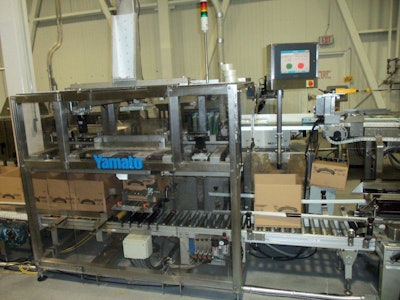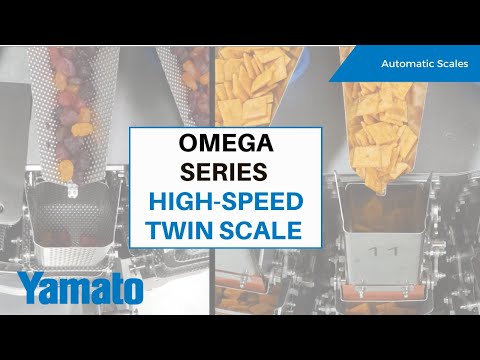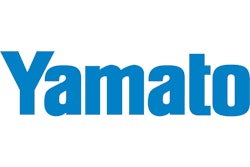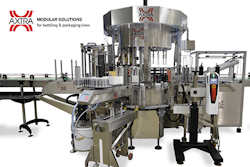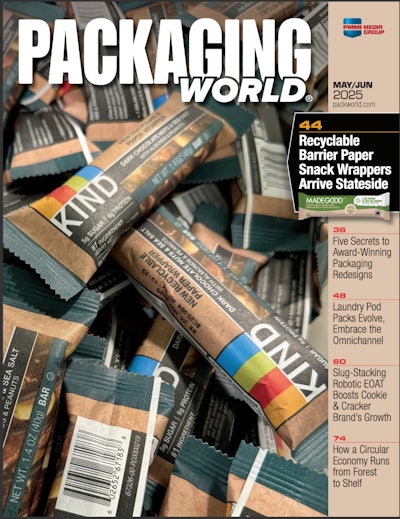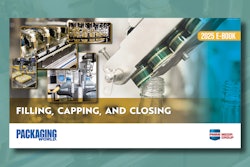In an economy where jobs are at the center of a national election-year climate, it sometimes takes a company like Odom’s Tennessee Pride to remind us that a strong workforce and automated equipment can work hand in hand to keep hard-working people employed.
Mike Cotriss, plant manager with Odom’s Tennessee Pride at the Dickson, TN, plant, raves about the local workforce’s dedication and commitment to the company. “In turn,” he says, “we’ve never laid anybody off. I tell people coming in here that we hire you for life.”
Started in 1943 by Douglas Odom Sr., the third-generation family company is now led by Larry Odom, president. The company dedicates itself to making high-quality, tasty, and safe sausage and chicken-based products that are sold nationwide either frozen or refrigerated.
Built in 1989, the Dickson facility’s capacity was nearly doubled to just shy of 100,000 sq-ft during a $23 million expansion in 2004. Today the plant employs in the neighborhood of 400 people. Many of them work on the plant’s nine wrapping lines, which operate two shifts daily, five days a week. A third-shift crew handles tear down and sanitation. The plant produces about 70 different SKUs, of which 85% are packed and sold in cartons, and the remainder in pouches.
The lines focus on ready-to-eat breakfast sandwiches and sausage balls. “When we expanded, we automated the plant,” relates Cotriss. “We believe we are now one of the most automated sandwich assembly plants in the country. We have six different production lines, but three of those lines combine two overwrapping machines for added capacity.”
New scale, vf/f/s line
The newest line, operational in late 2010, is dedicated to a sausage ball appetizer, which Cotriss describes as a regional favorite made of sausage meat, cheese, and biscuit mix. The ingredients are mixed, formed into balls and frozen. From processing, the frozen product is carried on an elevated conveyor to a vibratory conveyor that feeds a 14-head ADW-414SV rotary scale weigher from Yamato. “We just revamped our whole sausage ball line to give us the capacity to run 50 one-pound bags per minute,” says Cotriss.
As he explains, a previous bulk-and-dribble system limited production. “We’ve been very satisfied with Yamato,” he says. “Their equipment is very reliable. Their rotary scale is working great. Every night it’s taken apart for sanitation and put back together. It’s very easy to disassemble and very worker-friendly as far as cleaning is concerned. We haven’t had any issues with it. The whole training process was only three days for operators, maintenance, and production people.
The Yamato weighs the product and dumps the appropriate weight into a tube of film that’s formed and bottom-sealed on a new vertical form/fill/seal machine from Rovema. “This was a cartoning line before,” explains Cotriss. “We wanted to go with a more sustainable packaging format as part of an effort to cut down on our waste and use of paperboard. So we went to a printed film bag and that’s where Rovema came in. Rovema came out with the Yamato scale and presented it to us as a whole system, a one-piece unit.”
‘Tasty’ benefits
Previous experience with a Rovema machine for precooked gravy helped Odom’s select the vf/f/s machine for the new sausage ball line. “When Rovema came in and said they had a solution for the sausage line, we listened,” says Cotriss. “They came in and we looked at it and we said, ‘Wow, that will just about double what we were capable of producing [on a former sausage ball line].’”
Economic justification is achieved not only on the equipment’s productivity, but also in reduced labor costs. Says Cotriss, “There is nobody making cartons, and nobody stuffing the cartons. We probably took three or four people out of the sausage ball production area.”
The Rovema machine with Yamato scale runs one shift daily, with occasional overtime, at 50 bags/min. “It gave us the capacity we needed; we were running two shifts almost six days a week on the old system,” says Cotriss. “We took it down to one shift. So this was a major improvement for us. Those people are working in other locations in the plant.”
Odom’s uses a 5-mil film that can be microwaved or boiled with a very good oxygen barrier made by Ampac. The heat-sealed bags are packed by hand into corrugated shipping cases.
Sandwich lines
Odom’s hand-held breakfast sandwiches represent the company’s bread and butter, or biscuits and sausage to be precise. Two lines are manual to add the flexibility to accommodate two or three product changes per shift. Two sandwiches are wrapped in each pack.
The automated packaging lines use flow wrappers from Campbell Wrapper Corp. Packs are gas-flushed with carbon dioxide and nitrogen to evacuate oxygen and help the product achieve a 45-day refrigerated shelf life.
The wrappers use a specialty film from Bemis Co., Inc. Cotriss prefers not to reveal details about the barrier film. “Bemis is one of the few that can produce the film we need to run at 400 sandwiches per minute, per line,” he says. On the three sandwich lines equipped with two wrappers, 800 sandwiches are produced each minute.
Flow-wrapped packs discharge from the Campbell Wrapper machines, with 15 packs picked up on a robotic unit from the Cama Group. The robot pushes three rows of five packs into position, filling five cartons at a time. Caraustar supplies the cartons, which are litho offset-printed in seven colors and range in thickness from 14 to 22 pt. Cartons are subsequently closed and glued on a machine from Bradman Lake Group. The cartoner is equipped with an ink-jet coder from Hitachi America, Ltd.
Next, cartons are convened single-file across a checkweigher from OCS Checkweighers. “We recently switched over to the OCS units because they are very reliable and much more economical,” than the units they replaced, says Cotriss.
History with Yamato
Cartons pass through checkweighing to case packing, where seven Yamato case packers do the job on four sandwich lines. Cotriss heaps praise on the equipment, providing the following perspective: “A few years before our expansion, the chairman and CEO of Yamato Corporation worked with us to develop the actual case packers that we have on these lines. The case packers are the most reliable pieces of equipment we have in this plant. Downtime is minute. These machines are capable of 20 pushes per minute; that’s 120 cartons per minute.”
Using virtually the same packaging equipment on the lines is part of Odom’s strategy. “We try to standardize everything,” Cotriss confirms. “The benefits are that you keep a certain number of spare parts that are all interchangeable for each like machine. And then there’s the training for the maintenance guys who can now fix one type of machine rather running out to fix six or eight different ones.”
The Yamato case packers pack cartons into corrugated cases erected on equipment from Wexxar/BEL. Between four and 12 cartons are packed per case, depending on the product.
So, how does Odom’s justify the $23 million investment? “We justify it through increased capacity, in that we can sell more. This is the food business. Everybody wants to eat, and our company continues to grow,” says Cotriss with pride--Odom’s Tennessee Pride.
